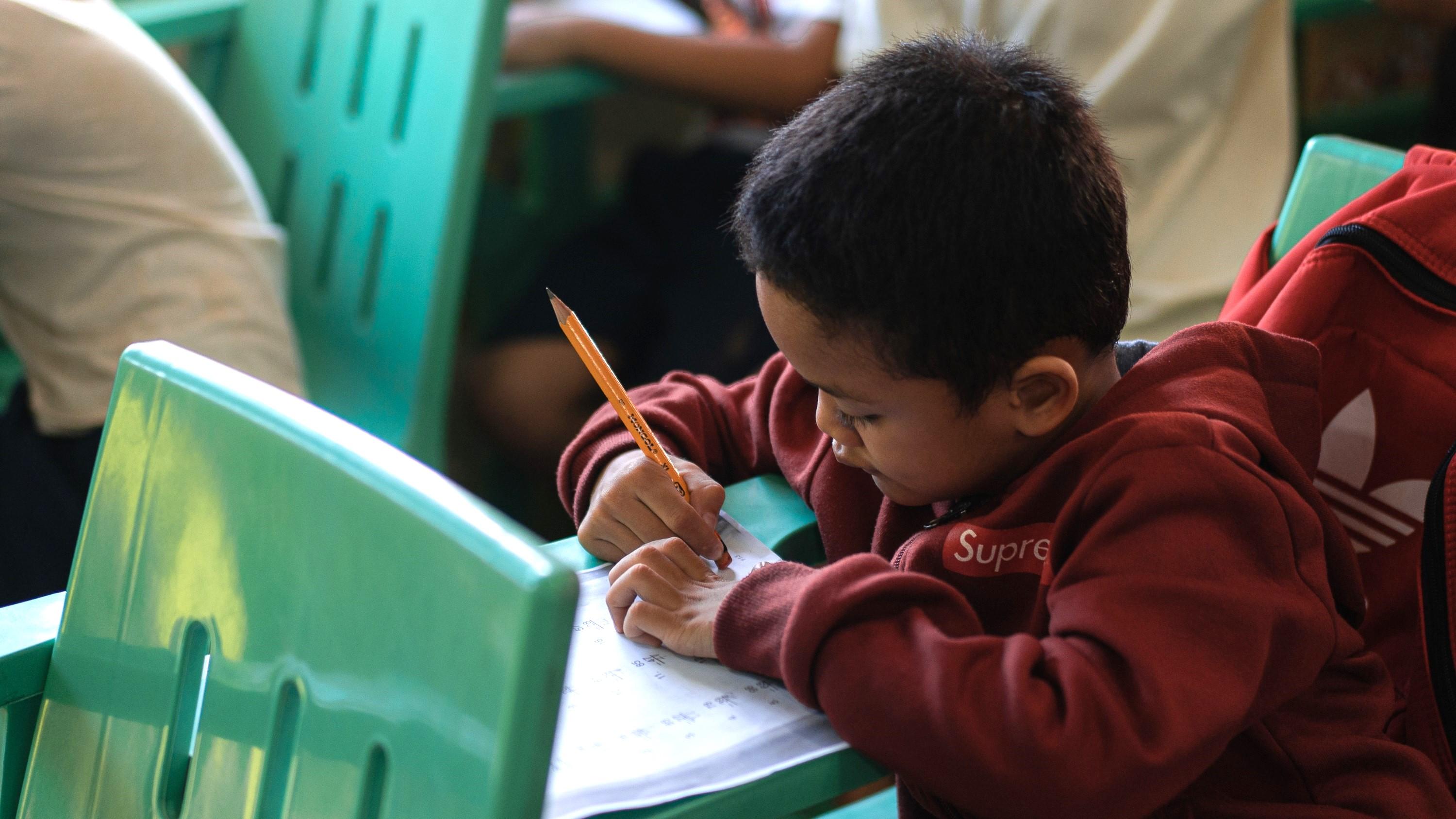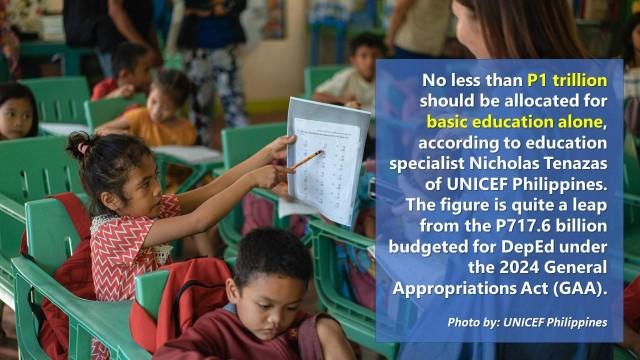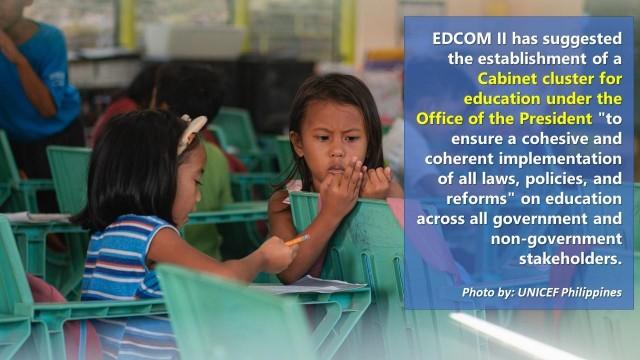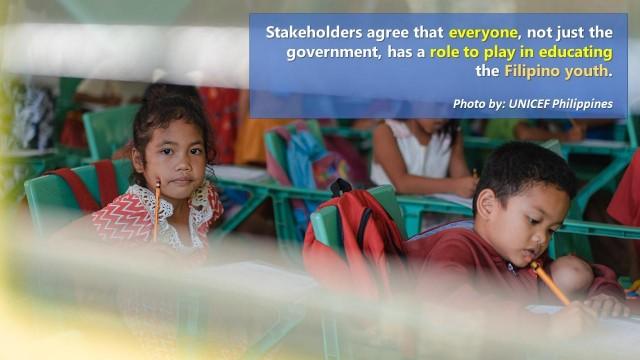The Cost of Miseducation: Task at hand for PH education

It takes a village to raise a child, an African proverb says.
In the Philippines, raising a child with proper education also requires money–and money spent well.
Even with the highest share of the national budget every year, the Philippine education sector cannot afford to waste a single centavo of its limited resources. Generations of Filipino learners have been paying the price.
In the final installment of this GMA News Online series, stakeholders share different views about handling the gargantuan challenge of uplifting the state of Philippine education. One thing they agree on, however, is that the task lies not just in the hands of a few, but with everyone hoping to build the future of the Filipino youth and the Philippines.
It takes more than a village. It takes a nation.
This is The Cost of Miseducation.
LAST OF THREE PARTS
Back to school, back to some of the same problems for Philippine education.
For the Department of Education (DepEd), it’s back to work, too, but with a transition of leadership unfolding.
After delving into government’s efforts to give the education the highest allocation under the national budget earlier in this series, outgoing DepEd spokesperson Undersecretary Michael Poa recognized that there are fiscal restrictions in place and that other agencies also need their share of the financial pie to run their own programs and operations.
“Siyempre, na-apektuhan naman talaga ‘yung quality of education because may limitations tayo [of course, the quality of education is affected because we have limitations] in terms of how many classrooms we can build, how many classrooms we can rehabilitate, how many learning resources or tools we can purchase. But, we always work with the budget that we have,” Poa told GMA News Online.
READ: FIRST OF THREE PARTS
The Cost of Miseducation: Lack of investment in PH education sector
READ: SECOND OF THREE PARTS
The Cost of Miseducation: Handling PH education's purse
P1 trillion for basic education
For the United Nations Children's Fund (UNICEF) Philippines, prudent spending in education should also come hand in hand with an appropriate budget increase.
Similar to the findings of the Second Congressional Commission on Education (EDCOM II), education specialist Nicholas Tenazas raised concerns about the lack of investment in the country's education sector.
For Tenazas, at least P1 trillion should be allocated for basic education alone–quite a leap from the P717.6 billion budgeted for DepEd under the 2024 General Appropriations Act (GAA).
Pending the approval of the 2025 national budget, however, Tenazas acknowledged that raising DepEd’s budget by that much was a long shot.
“Malaking laban ‘yun. Talagang upheaval sa Congress ang mangyayari kung biglang additional P250 billion ang idagdag in one year,” he said.
(That's a big fight. There will be an upheaval in the Congress if the budget will suddenly be increased by P250 billion in just one year.)

Despite this, Tenazas said there were still many ways for DepEd to make the most out of the budget it is given and improve operations in the education system.
UNICEF can extend a helping hand, Tenazas said, when it comes to producing innovative solutions for Philippine education, which may be inspired by the best practices of other countries.
“Kung mga traditional or ‘yung mga usual na programs ang ginagawa natin, parang hindi rin tayo makapag-expect ng masyadong malaking change du’n sa results ‘di ba? Kaya what if mag-model tayo with the government using their own systems? Subukan natin ‘yung mga ibang innovation na maisip natin locally,” Tenazas said.
(If we keep on doing the traditional or the usual programs, we can't expect much changes in the results. So, what if we model with the government using their own systems? Let's try the other innovations that we can think of locally.)
“May mga countries na pareho ng context natin or pareho ng situation. May mga programs din sila na gumagana. Pwede rin tayong mag-benchmark sa kanila, pwede tayong magdala dito ng innovation na pwede natin i-contextualize dito sa local situation natin,” he continued.
(There are countries that have the same context or the same situation as us. They also have programs that work. We can benchmark on those innovations and can contextualize them in our local situation.)
Equitable budget increases
Citing underinvestment in education and poor management of the education bureaucracy as factors for deteriorating education quality since EDCOM I in the late 1990s, the second congressional commission put forward other more recommendations on how the system could be better governed and financed.
One of which is to sustain increases in the education investments.
However, the commission emphasized that aside from increasing the budget, it was also important to ensure that resources would be allocated in an equitable manner, strategically impact learning outcomes, and utilized on time.
Aside from this, it also called for the review of the Boncodin Formula, which has been used since 2013 to compute the budget for school maintenance and other operating expenses (MOOE).
While the formula seeks to cover the full operating costs of public elementary and high schools, the EDCOM II found that the formula only accounts for the number of learners, teachers, and classrooms, perhaps impacting the sufficiency of school funds.
“This puts small-sized schools and schools with unique contexts at a disadvantage,” the EDCOM II report said.
Also raised in the report was the need to formulate a framework that guides how the provincial Special Education Fund (SEF) could complement the municipal SEF “in the interest of promoting equitable and needs-based allocation.”
Cabinet cluster for education
Further, EDCOM II suggested the establishment of a Cabinet cluster for education under the Office of the President “to ensure a cohesive and coherent implementation of all laws, policies, and reforms” on education across all government and non-government stakeholders.
The commission said the proposed Cabinet cluster will also come up with an integrated national education and workforce development plan.
It will be headed either by an existing Cabinet member with a direct stake in education or a presidential adviser with a secretary rank.
In 2000, the National Coordinating Council for Education (NCCE) was formed almost a decade after the EDCOM I proposed its creation in a bid to “mitigate the risk of nonalignment” between the education sub-sectors composed of DepEd, Commission on Higher Education (CHED), and the Technical Education and Skills Development Authority (TESDA).
However, the NCCE was abolished seven years later after failing to do its expected roles.
New leadership
The issues raised by EDCOM II have long plagued the system, leading to “miseducation” or poorly delivered education to Filipino learners, which the commission acknowledged. Several administrations have come and gone, but some problems still await solutions.
Now that a new secretary is set to lead DepEd, what should be expected of him, given the “learning crisis,” as described by EDCOM II, in Philippine education?
Senator Sherwin Gatchalian, chairman of the Senate Committee on Basic Education, said that the incoming DepEd chief should have the grit, political will, and stamina to withstand all of the challenges in the sector.
More importantly, the senator hoped that the next leader would no longer experiment with possible solutions.
“He should have the knowledge on what are the problems in our education system and also the knowledge on what are the solutions to address those problems,” Gatchalian said.
“The new secretary should hit the ground running. No learning curve. That person will be managing the biggest bureaucracy in our government–one million bureaucrats plus teachers, and 27 million students, both in public and private. So, you're talking about a really heavy task.”

‘Start early’
Following the resignation of Vice President Sara Duterte as DepEd secretary, President Ferdinand “Bongbong” Marcos Jr. named Senator Sonny Angara as her successor.
Angara is a commissioner of the EDCOM II.
In the Senate, Angara pushed for educational reforms, including the Universal Access to Quality Tertiary Education Act, as well as the Enhanced Basic Education Act of 2013, which institutionalized the government's K to 12 program.
While UNICEF has made its own list as to what pressing issues Angara should focus on upon assuming post, the organization highlighted the need to prioritize early childhood education and the learning recovery for learners up to Grade 3.
“Mas maganda ang effectiveness at efficiency ng efforts natin kung mas maaga tayo mag-start,” Tenazas said.
(The effectiveness and efficiency of our efforts would be better if we start earlier.)
“Mas malaki ang chance na nasi-stimulate ‘yung utak ng bata ‘pag nasa daycare center siya… Based din sa mga research, pagka ang bata ay nag-preschool, ‘yung mga advantages niya nagpe-persist hanggang sa elementary years niya, hanggang sa high school,” he added.
(There’s a bigger chance that a child's brain would be stimulated if he or she is in a daycare center... Research also showed that when a child goes to preschool, the advantages gained will persist until high school.)
The organization also appealed for Angara to change the strategy in terms of teaching and learning, in order for Filipino students to perform better in international large-scale assessments like the Programme for International Student Assessment (PISA).
Budget review
Tenazas also expressed hope that the incoming DepEd secretary would still review the proposed budget of the agency for fiscal year 2025.
A P792-billion budget is being sought by DepEd next year under the 2025 National Expenditure Program (NEP), which was prepared under Duterte’s leadership.
Gatchalian also made the same call to Angara, saying he is confident that the latter would still analyze and tweak the proposed budget.
Prior to the effectivity of Duterte’s resignation on July 19, Angara has made several commitments once he takes the helm of the agency.
Among these is his full support to raise teachers' salaries, and the continued implementation of the K to 12 program.

Helping hands needed
Aside from assistance from international organizations, the DepEd said it also welcomes help from various local government units (LGUs) to manage the financial situation of schools on the ground.
“Dapat siguro, ma-consider din natin dito sa investment ‘yung mga tulong din na binibigay ng LGUs or spending na ginagawa ng LGUs alongside, siyempre, ‘yung budget na binibigay for education, specifically for the Department of Education, in terms of basic education,” Poa said.
(Perhaps, we should also consider the aid and spending extended by the LGUs alongside, of course, the budget provided for education, specifically for DepEd.)
Even the EDCOM II pointed out that its success lies not in solving all the problems that were raised in its year one report. It said that everyone has to work hard and work together to fix the learning crisis in the years to come.
The commission underscored the importance of solidarity among all education stakeholders as the crisis, it said, is “complex, immense, and has become deeply rooted in a sector that has for many years suffered from piecemeal, albeit well-intentioned, reforms.”
“Only then can we create true synergy; only then can we execute a true strategy, build a true system; only then can we shed our disconnects and embark on a collaborative journey that will allow the Filipinos to fulfill their truest potential,” the report read. — VDV, GMA Integrated News




